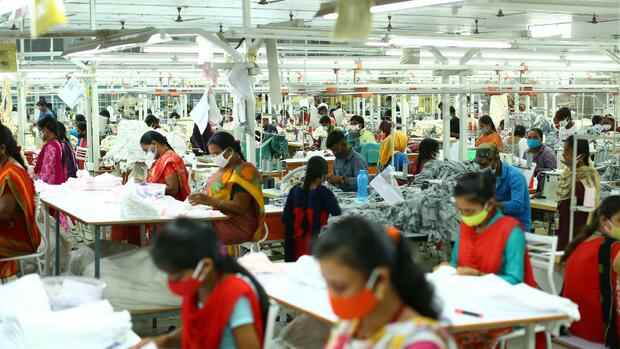The supply chain law aims to improve working conditions.
(Photo: obs)
Berlin It is an unusual dispute: members of the Alliance for Sustainable Textiles have publicly attacked companies such as Trigema, Wilox and Peppermint Holding. Since a test run for the new supply chain law, these companies have left the textile alliance, it is criticized in a statement.
It goes on to say: “Anyone who refuses to take part in this process fails to recognize the future-oriented importance of due diligence for building resilient supply chains with respect for people and the environment.” It is now becoming apparent who is ready to get involved.
The alliance of companies and associations, non-governmental organizations, trade unions, standard organizations and the federal government has set itself the goal of improving the conditions in global textile production, from raw material production to disposal. Now, of all places, the dispute over the new supply chain law arises here.
The Supply Chain Due Diligence Act (LkSG), as it is officially called, was passed in June and will apply from 2023 to companies based in Germany with at least 3,000 employees. They are then obliged to ensure compliance with minimum social and ecological standards, also for their suppliers abroad.
Top jobs of the day
Find the best jobs now and
be notified by email.
This includes, for example, the prohibition of child or forced labor or of harmful water or air pollution. But the new regulations are already becoming a challenge for companies – in several ways.
Extensive precautions necessary
Legal expert Eric Wagner from the law firm Gleiss Lutz explains: “Actually, companies should already begin to focus on the regulations.” But due to the corona crisis, many struggled with supply chain bottlenecks and suppressed future obligations. “Anyone who has to be happy to get the necessary products and materials may shy away from confronting suppliers with new compliance requirements,” says Wagner.
And his colleague Marc Ruttloff adds that the companies weigh up how much pressure there is, what is their own negotiating position and what alternative sources there are. Often they then believed their business partners had “the extra leverage”.
However, companies affected by the law will have to take extensive precautions across the group in the coming months. It is important to set up a risk management system with which it is determined which suppliers are at risk of human rights violations or violations of environmental standards. “It’s also a question of capacity,” explains Ruttloff. “Some clients have over 150,000 suppliers.” In addition, the company’s own business areas and production facilities at home and abroad should also be recorded.
Specifically, the companies then have to carry out regular risk analyzes, define preventive measures and take remedial measures if violations of the standards are found. Documentation and reporting on compliance with due diligence requirements are also required.
Attorney Wagner says: “Companies can no longer push these tasks away from themselves.” Ultimately, it is even an opportunity to get a better grip on the delivery bottlenecks caused by the crisis. “Those who have a better overview of their suppliers also have a better database for their supply chain management.” Then it becomes clear how dependencies can be reduced.
Bafa wants to help companies
In future, the Federal Office of Economics and Export Control (Bafa) will monitor compliance with the Supply Chain Act and impose sanctions in the event of violations. These can be fines “which, at up to two percent of the annual group turnover, can be quite sensitive for the company,” says Ruttloff. However, there could also be a threat of exclusion from public procurement procedures.
The supply chain law can start with “gap analyzes” or audits, with which it becomes clear which precautions companies have taken in the area of human rights and environmental standards and where gaps still need to be closed because the new law demands more. Bafa has also announced that it will develop assistance for companies.
More: The Constitutional Court rejects a complaint against the Corona emergency brake
